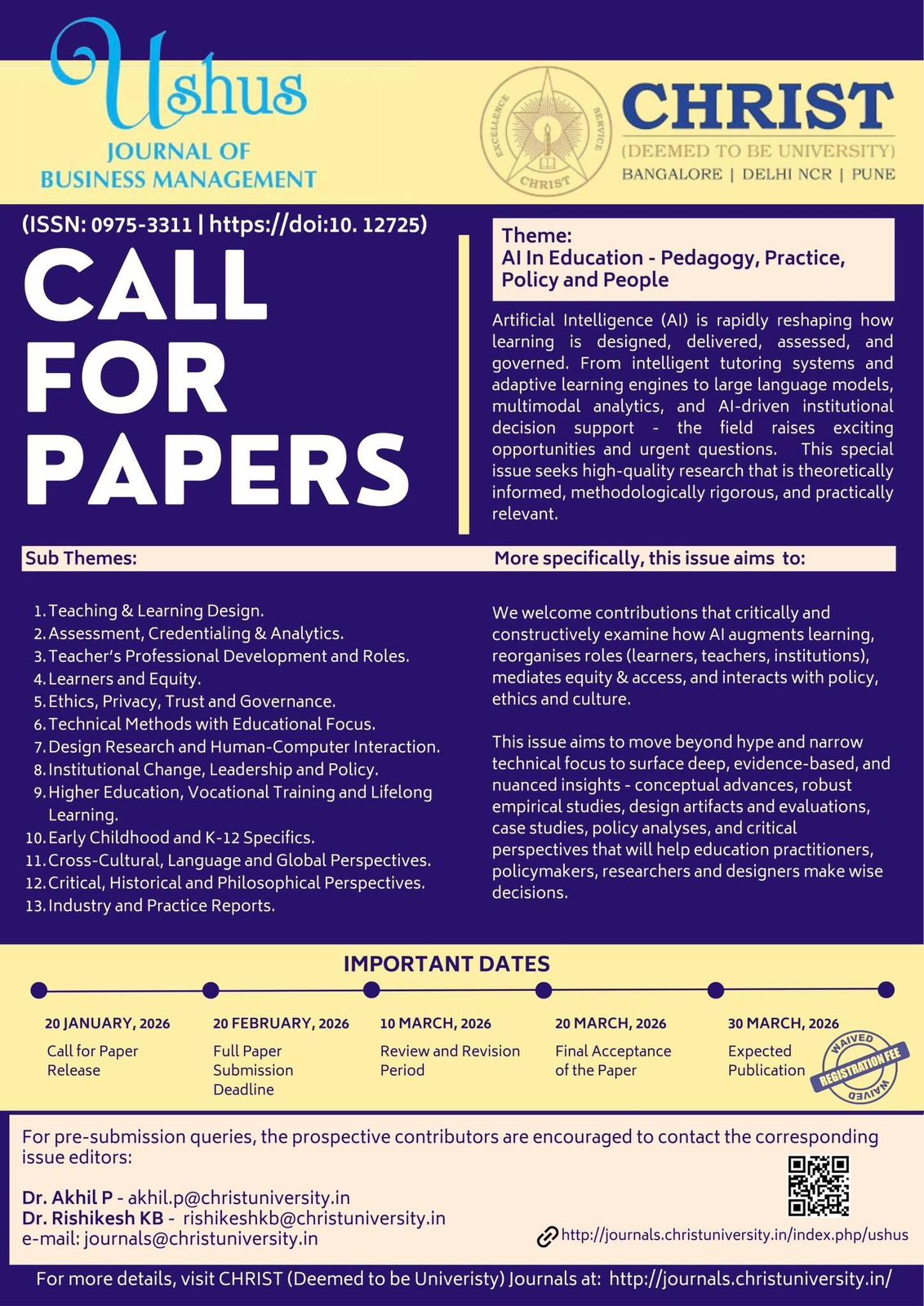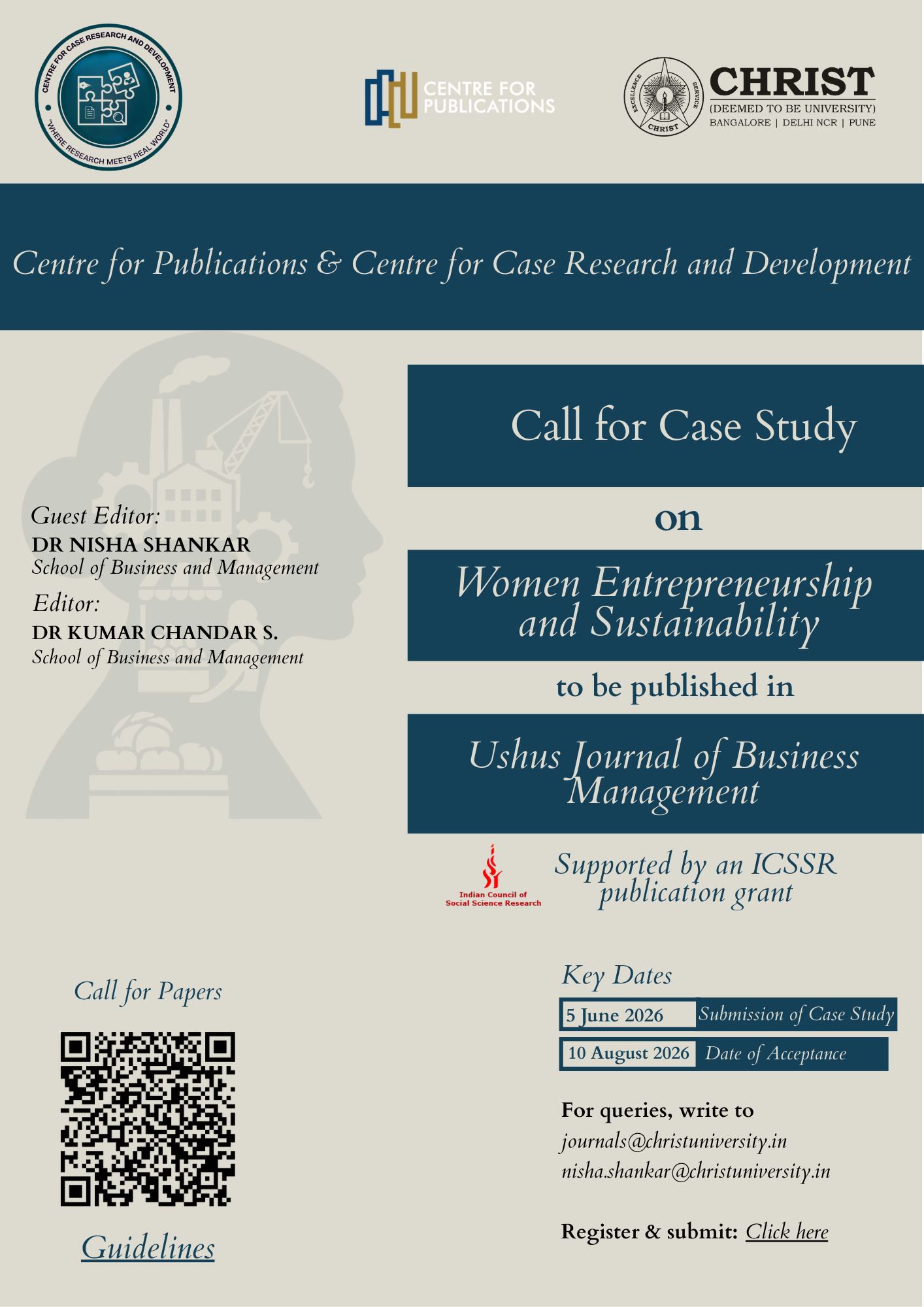Consumer Behavior Towards Metro Rail Services in Bengaluru
DOI:
https://doi.org/10.12725/ujbm.71.4Keywords:
Metro services, Public transportation, Metro usage, Perceived utility, Last-mile connectivity.Abstract
With an emphasis on important elements including timeliness, cleanliness, ticketing effectiveness, security, price, accessibility, and general convenience, this study investigates commuter satisfaction with metro systems. The majority of commuters value the metro's dependability, effectiveness, and affordability, according to the study's findings, which are based on a poll of metro users. The respondents were pleased with the cleanliness of the station and felt that the ticketing process was simple. The necessity for real-time service updates, accessibility for individuals with impairments, and last-mile connectivity are among the issues that still exist. Some commuters want improved interaction with other public transportation networks, even though the fares are thought to be fair. Additionally, station infrastructure, seating availability, and security need to be improved. Many respondents are hopeful about the future of metro services, expecting improvements and expansions in spite of these problems. The study emphasizes how crucial it is to make ongoing investments in accessibility, technology, and infrastructure in order to raise user happiness and encourage sustainable urban mobility. Metro systems are crucial for effective and sustainable urban growth because they may encourage more people to use public transportation, lessen traffic, and have less environmental impact.
References
Ajzen, I. (1991). The theory of planned behavior. Organizational Behavior and Human Decision Processes, 50(2), 179–211.
Allen, R. C. (2017). The Industrial Revolution: A very short introduction. Oxford University Press.
Atri, P., & Dev, M. (2023). Modeling departure time choice of metro passengers: A case study of Delhi Metro. Transportation Research Procedia, 69, 123–130.
Chatterjee, S., & Kar, S. (2020). Price elasticity and ridership behavior in Kolkata Metro. Journal of Urban Transport, 15(2), 45–57.
Huan, N., Hess, S., & Yao, E. (2022). Understanding the effects of travel demand management on metro commuters’ behavioural loyalty: A hybrid choice modelling approach. Transportation, 49(2), 343–372. https://doi.org/10.1007/s11116-021-10194-4
Kumar, R., & Satbhaiya, R. (2021). Analysis of a substructure part of metro structure as per live data using analysis tool: A review. International Journal of Scientific Research in Civil Engineering, 5(4), 53–61.
Li, Y., & Liu, X. (2018). Service reliability and commuter satisfaction: Evidence from Beijing Metro. Transportation Research Part A: Policy and Practice, 110, 149–163. https://doi.org/10.1016/j.tra.2018.02.004
Mandhani, J., Nayak, J. K., & Parida, M. (2021). Establishing service quality interrelations for metro rail transit: Does gender really matter? Journal of Transport Geography, 92, 103014. https://doi.org/10.1016/j.jtrangeo.2021.103014
Mishra, A., Singh, P., & Tiwari, R. (2023). Gender differences in metro travel behavior: A study of Lucknow Metro. International Journal of Transportation Science and Technology, 12(1), 34–42.
Optraffic. (2024, June 26). Innovative solutions to reduce traffic jam. https://www.optraffic.com/news/innovative-solutions-reduce-traffic-jam
Parasuraman, A., Zeithaml, V. A., & Berry, L. L. (1988). SERVQUAL: A multiple-item scale for measuring consumer perceptions of service quality. Journal of Retailing, 64(1), 12–40.
Parihar, S. S., Rai, P., & Siddiqui, M. (2021). A study of commuter’s shift behaviour towards new age convenient transport services. FIIB Business Review, 10(2), 172–180. https://doi.org/10.1177/23197145211009058
Rao, V., & Patel, M. (2021). Analyzing passenger perception of safety in Ahmedabad Metro. Urban Rail Transit, 7(3), 215–227. https://doi.org/10.1007/s40864-021-00143-5
Rodrigue, J.-P. (2024). The geography of transport systems (6th ed.). Routledge.
Sachdeva, Y. (2020). A critical evaluation of the impact of Jaipur Metro on means of transport (Doctoral thesis, University of Kota). University of Kota.
Sharma, R., & Singh, A. (2022). Factors influencing adoption of smart ticketing systems in Bengaluru Metro. Journal of Public Transportation, 25(1), 78–93. https://doi.org/10.5038/2375-0901.25.1.5
United Nations. (2023). World urbanization prospects: The 2022 revision. United Nations, Department of Economic and Social Affairs, Population Division. https://population.un.org/wup/
Verma, A., Dash, S., & Ghosh, S. (2019). Role of last-mile connectivity in Mumbai Metro ridership: Barriers and enablers. Transportation Research Procedia, 48, 3218–3227. https://doi.org/10.1016/j.trpro.2020.08.104
Vuchic, V. R. (2007). Urban transit systems and technology. Wiley.
Downloads
Published
How to Cite
Issue
Section
License
Copyright (c) 2025 Avil Saldanha, Nishka S

This work is licensed under a Creative Commons Attribution-NonCommercial-NoDerivatives 4.0 International License.



